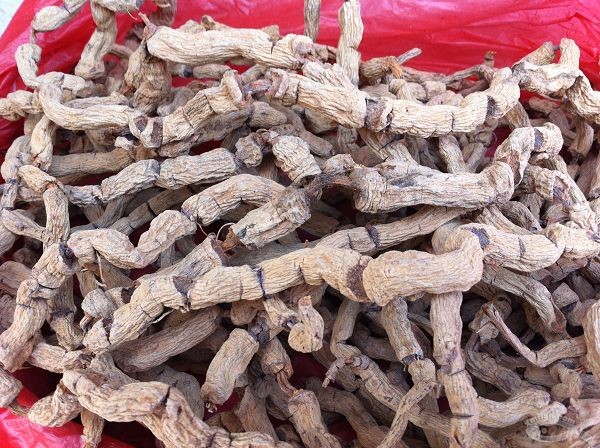In the West it refers to the root of Morinda Officinalis, which grows in Fujian, Sicuan, Guangdong, Hainan and Guangxi provinces in south China. It belongs to the family of Rubiaceae and the plant can be spotted mostly in river sides, mountains, and forests etc. And now most of them are grown for medicinal purpose in China.
As one of lianoid shrubs, it has succulent cylindrical tubers, normally in irregular shape. The stem is with small vertical ridge, hirsute when young. The size of oval leaves is from 3 to 13cm long and 1.5 to 5cm wide. It is capitate, 2 to 10 flowered, fleshy corolla white, and up to 7mm long sometimes. The drupe is subglobose, 6 to 11mm in diameter, 3-to-6 locular, and red when mature.
A commonly used tonic herb in Chinese herbal treatments, Ba Ji Tian, or morinda root in English, is so popular probably because of its special relationship with kidney, an organ linking so closely to libido in Traditional Chinese medicine (TCM) theory. Kidney is more than just a common organ in this level and herbalists tend to believe that this important Zu-Fu is intimately related to impotence, infertility and other reproductive health matters. For better understanding of how this herb functions, the concept of kidney in TCM will be the first problem to work out.

Morinda root
KIDNEY IN THE THEORY OF CHINESE MEDICINE
Before going further, it is a good idea to explore the notion of kidney at the Traditional Chinese Medicine level now. Kidney, in the shape of a bean, is one of internal organs of the urinary system in Western medicine, which flanks L1 to L3 lumbar vertebrae. It is in charge of secreting and excreting urine and regulate body fluid metabolism. If there is something wrong with kidney, normally organic lesions is involved, such as glomerulonephritis, pyelonephritis, kidney stone, and renal tuberculosis, etc.
Kidney in TCM, however, is quite different. The understanding of kidney pathophysiology is beyond itself from this angle. It is more and broader. For instance, the pyelonephritis may present different patterns in TCM's eye, which could be kidney Yin or Yang, and kidney excess or deficiency. Based on the different presentations, different herbal remedies might be applied.
Given the above reason, practitioners believe that kidney functions on a few vital jobs like storing the essence, controlling bone, promoting urination and bowel movements, supervising the growth and development, and managing sexual reproduction besides of regulating body fluid metabolism.
WHAT"S MORINDA OFFICINALIS USED FOR?
It is acrid, sweet and warm in nature and goes to liver and kidney meridians. Main clinical use and indications are Impotence, Spermatorrhea, and Premature Ejaculation due to deficiency of the kidney, lower abdominal cold pain, urinary incontinence, female infertility due to cold uterus, pain and numbness because of wind-cold, soreness and weakness of low back and knee, and rheumatism etc. The usual dosage is from 8 to 12 grams.

![Diseases, Symptoms, tcm, [tcmwindow.com]](/uploadFile/adImg/2015/11/11/f5cbfcc0-4df5-4646-9b9a-f316651a0199.jpg)





